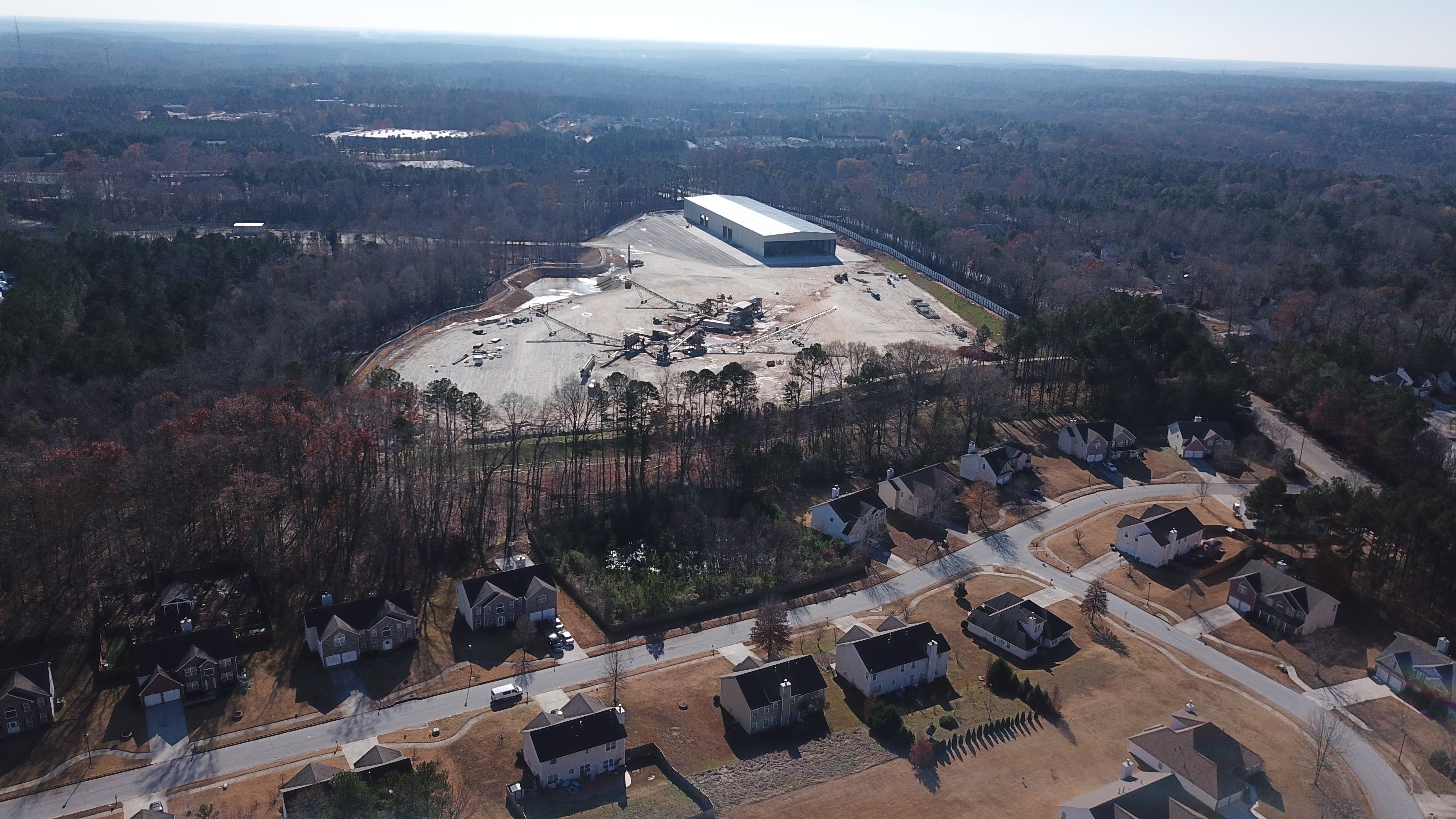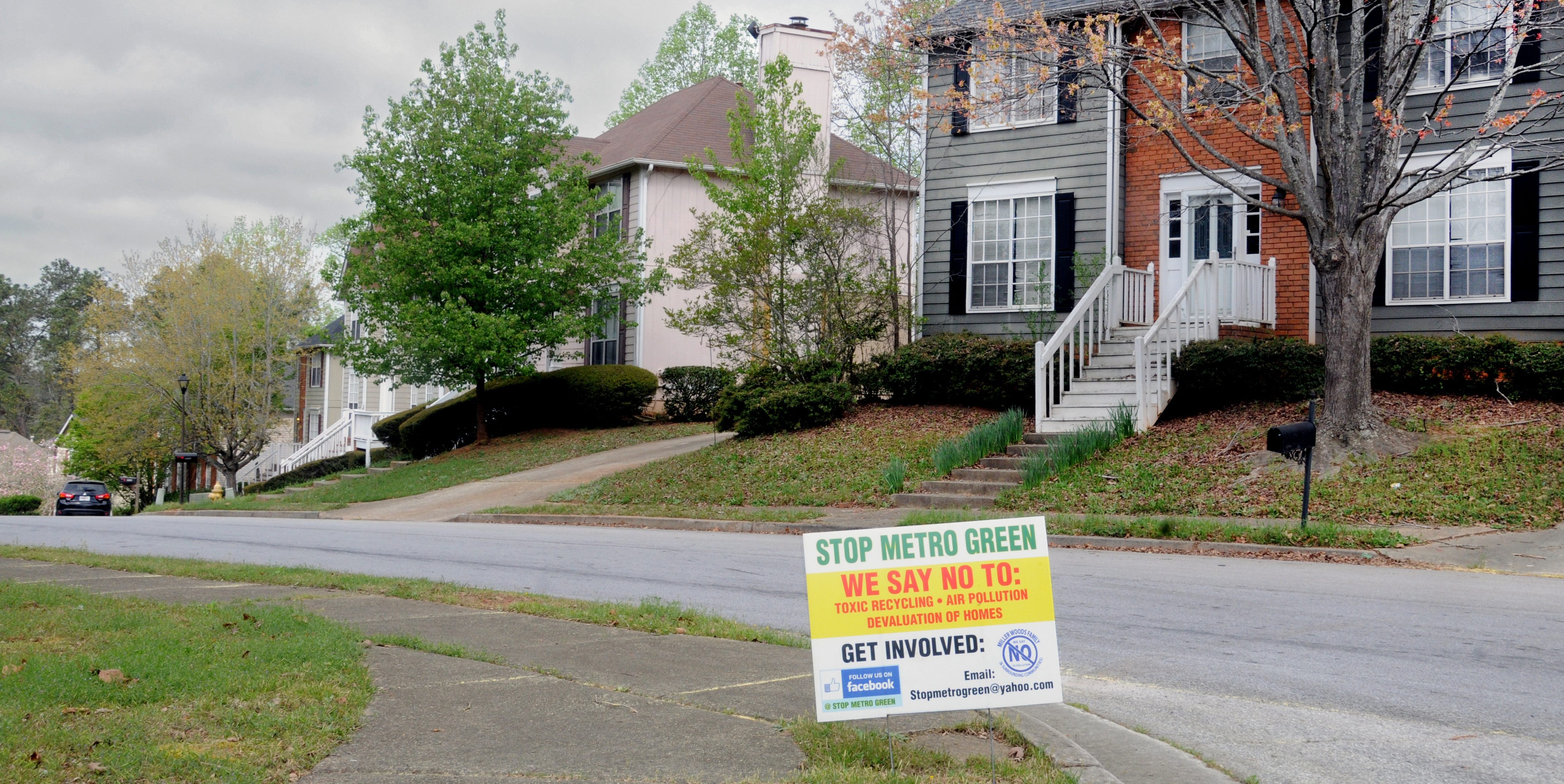‘It Is Wrong’: DeKalb Residents Fight Industrial Facility Near Their Neighborhood
Residents of south DeKalb County are trying to stop an industrial development next to their neighborhoods.
They say the project never should have been permitted and that it threatens people’s health and property values in their area. The fight has escalated to a lawsuit, with a backdrop of political turmoil in a newly created city.
‘This Is A Business Coming’
Pyper Bunch first realized something was going on near her subdivision when she began reemerging from her home after the early pandemic days of sheltering in place. She said she’d been working from home and had barely left the house.
When she did, she saw that what had been a forest across from her subdivision had been cut down.
“Just everything is gone, except for this one row of trees,” she said. “I couldn’t believe it.”
Bunch raised two kids in the home she’s owned for more than 20 years in a subdivision in suburban DeKalb County, just outside the Perimeter.
In that time, she said she’d never given a whole lot of thought to the forest across the street from her neighborhood. But then it was gone, and she didn’t know what was replacing it.
She said her first guess had been more homes since the immediate area is pretty residential. So she and her husband started exploring and eventually found a road leading to the construction site.
“And we walk down the road and my husband immediately sees steel beams,” she said. “And he says, ‘This is not a subdivision. It’s not an apartment building. It’s not townhouses. This is a business coming here.’”

“He said nobody would put steel beams for a home, townhouses, apartments,” she said.
Bunch’s family wasn’t the only one trying to figure this out.
Jennifer Wilson and her husband, who live in the same subdivision, were also looking to find out why all the trees were getting cleared.
“And we couldn’t find it,” Wilson said. “He kept digging and digging.”
Wilson and Bunch didn’t know each other at the time. Wilson’s family lived in the subdivision for more than two decades and the two family’s kids overlapped in school.
Wilson’s husband eventually learned that the property being developed is in the recently formed city of Stonecrest. Their neighborhood is just outside Stonecrest city limits in unincorporated DeKalb.
What was being built was a construction recycling center.
“At that particular time, the city of Stonecrest was saying, ‘Oh, this is a good idea. This is wonderful. This is going to be great,’” Wilson said. “And it’s like, no, this is a dump. This is a landfill, and it’s right across the street.”
The facility is for processing construction waste like wood, metal, soil and asphalt, taking in up to 400 tons of material a day, crushing up concrete, diverting whatever can be reused and hauling the rest off to dumps.
This was not what these women wanted next to their neighborhood.
“Imagine the sound of tons of concrete just being dumped on the ground and the reverberation that you’re going to feel,” Bunch said.
Bunch said she worries about dump trucks coming through and idling in their residential area near a school. She worries about the effects on air quality and on people’s health from the facility. And she worries about the neighborhood and its property values.
“The emissions, the crushing of the concrete, in a facility that’s sitting a few feet from somebody’s backyard,” Bunch said. “It is wrong. It is just morally wrong.”
Bunch said that when she learned what was being built, she felt like she had to do something.
“Because people were telling me to sell my house. It’s a done deal. And I’m not selling my house,” she said.
By this time, Bunch and Wilson had met. Neither woman had been involved in activism aside from their PTAs before. But they and a few other neighbors started organizing.
‘They Chose To Put It In South DeKalb’
This was all happening last year while things were closed down for the pandemic. They couldn’t physically go to Stonecrest City Council meetings, so they organized car protests with people honking outside City Hall.
And they started reaching out to elected officials.
“It was brought to all of our attention,” said Stonecrest City Councilman Rob Turner. “The residents in the community, giving me calls, calling different staff people for the city and asking what was going on.”
Turner, who represents the area where the facility is being built, said he had known about the project before, but it had been presented to him as a done deal. Not something the City Council would take a vote on.
“It was just a situation where, I was just invited for, I guess, a courtesy sake,” he said. “It was already done; it was not that I was going in there to approve.”

But there’s a backstory on how the facility got approved for that spot, and those who are opposed to the project — people like Pyper Bunch, Jennifer Wilson, and now Rob Turner — say the backstory shows that the facility never should have gotten the go-ahead in the first place.
The company building the facility is Metro Green. They have a couple of other recycling centers like this one around Atlanta. Metro Green first went to DeKalb County about this project a few years ago, and the county said no to the facility.
DeKalb County’s director of solid waste, Tracy Hutchinson, testified at a hearing last year saying that she did not approve the facility because it didn’t comply with DeKalb’s solid waste management plan.
The county itself handles all that kind of waste — it doesn’t allow other companies to come in and do the same thing. And Hutchinson said there was a racial justice side to it, too.
“Years ago, there was a push from the community, community activists, to stabilize South DeKalb,” Hutchinson said at the hearing. “South DeKalb, a few years ago, had the highest number of landfills and transfer stations that actually operated in the state of Georgia.”
DeKalb Commissioner Mereda Davis Johnson, who represents that part of the county, said she sees the development as part of a pattern. However, she emphasized this is all her personal opinion, not an official or legal position of the county.
“They didn’t choose to put this facility in central DeKalb, or north DeKalb. They chose to put it in south DeKalb,” Johnson said.
It’s not just landfills — or, in this case, facilities diverting waste from landfills – said Renee Cail, president of the DeKalb County-based Citizens for a Healthy and Safe Environment, known as CHASE.
“We have had numerous battles against corporations coming into the community, with polluting industries, without any regard for us as residents,” she said. “It’s been a tumultuous effort to try to stay safe.”
Cail, whose work with CHASE is all volunteer-based, said she has fought proposed asphalt, cement and biomass plants, as well as a slaughterhouse.
“It gets really, really exhausting,” she said. “It’s not that we’re against economic development. We want to have a great, thriving, robust city.”
Construction Is Done, Lawsuit Continues
After getting turned down by DeKalb, Metro Green went to the city of Stonecrest itself and asked for permission.
A Stonecrest administrator said yes to the project, and that was enough for the state Environmental Protection Division to issue a permit. Construction began.
And that’s when Bunch, Wilson and others figured out what was going on and started organizing.
They reached out to reporters. They protested outside of Stonecrest City Hall, and they attended Stonecrest’s virtual City Council meetings. And eventually, it worked.
Stonecrest changed its mind, and the city filed suit to stop the project it had permitted. Hearings in that lawsuit are going on now.
The Southern Environmental Law Center is representing CHASE on behalf of residents like Bunch and Wilson. They sided with Stonecrest in the case against Metro Green.
Metro Green had no comment for this story, but in a recent hearing, attorney Matt Benson, who represents the company, told the judge that the company hadn’t done anything wrong.
“In fact, both Metro Green and the city of Stonecrest did everything each was supposed to do,” he said.
Benson said the property was zoned for industrial use, that Stonecrest had issued multiple permits and licenses approving the project and that challenges to the project are coming too late. He said Stonecrest did the right thing the first time around when it gave permission to build.
“Metro Green and the city of Stonecrest did nothing wrong and complied with the law,” he said.
In the hearing earlier this month, Benson said construction on the recycling facility is now complete. According to the Georgia EPD, the facility is not yet allowed to start receiving waste until it gets an additional certification.
Stonecrest has only been incorporated for a few years, and the new city has had a rocky start.
This year, the city has run into problems, documented by the Atlanta Journal-Constitution, around its handling of pandemic relief funds. The mayor, who has been treated for cancer, went back on medical leave after an internal city investigation on CARES Act spending was released.
Bunch lives just outside of the city limits, so she didn’t have a vote on Stonecrest being incorporated. But, she said, she never thought the new city would be bad for her.
“Because when I look at the picture, I see all Black faces,” she said. “And you just think we’re one. This is great. We got an all-Black government, they’re going to come in here, and they’re going to really do great things.”
The lawsuit is ongoing. Attorneys representing the neighborhood residents have asked the judge to stop the project from proceeding.








